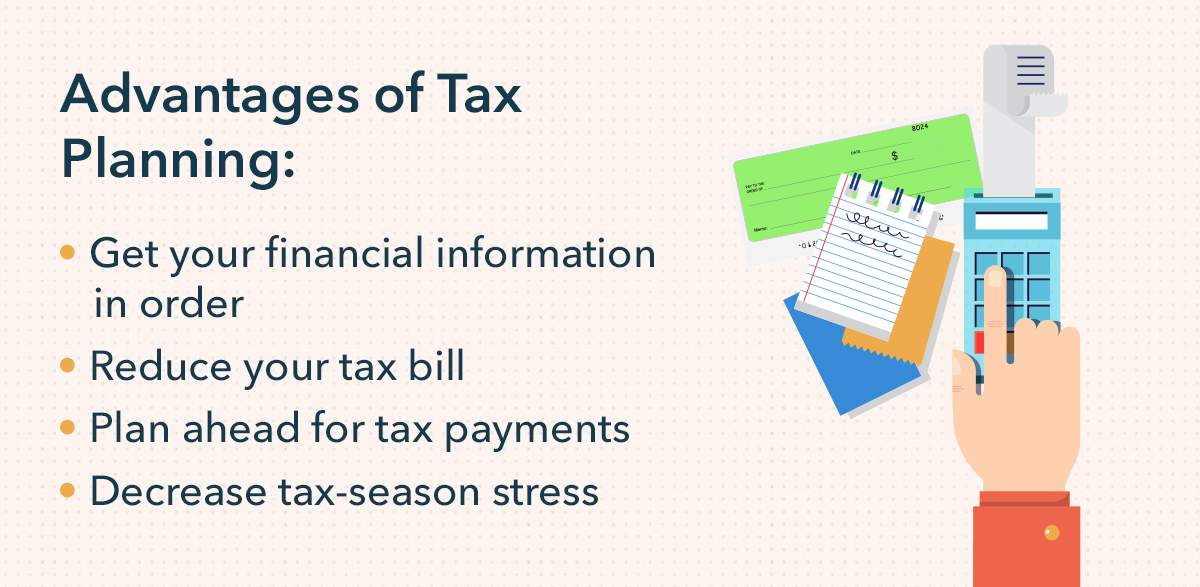6 Tax-Planning Tips: Your Year-End Tax Planning Guide
What is Tax Planning?
Tax planning is the process of reviewing your financial information from the previous year before filing your tax return. This is done by taking a closer look at what tax benefits you can take advantage of, strategically planning large purchases, reducing taxable income, and more.

Save more, spend smarter and grow your money

Tax planning is the practice of analyzing and arranging your financial situation in such a way that you can reduce your tax liability, or the amount you owe at the end of the year. With proper income tax planning, you can get more tax breaks and pay less taxes when tax season approaches.
In this article, we will go deep into tax planning and give you some year-end tax planning tips. We’ll discuss the basics of tax planning and tax season money management, including tax planning strategies you can use to reduce your tax bill. Keep reading to learn more about tax planning and how you can get started today.
What is Tax Planning?
Tax planning is the act of setting yourself up for a lower tax bill, which can be accomplished by carefully accounting for income and purchases, among other things. Most people are required to pay taxes to the IRS, and those taxes can be a significant portion of a person’s income. With year-end tax planning, you can reduce your tax liability, which could mean a bigger tax refund or a lower tax bill when tax season approaches.
Tax planning can:
- Get your financial information in order
- reduce your tax bill
- Plan ahead for tax payments
- Reduce tax-season stress
What is Tax Planning Vs. tax evasion
Keep in mind that there is a difference between tax planning and tax evasion. Tax planning is using legal strategies to reduce your tax bill, while tax evasion is the practice of illegally avoiding the taxes that you have to pay. Incorrect tax returns are a common form of tax evasion. If you falsify your taxes, you could face penalties including hefty fines and time in jail.

Why is tax planning important?
Tax planning is an important part of reducing your tax liability and ensuring that you can pay your taxes when tax season approaches. If you do not file and pay your taxes on time, you may be subject to tax penalties. Here are some common tax penalties that taxpayers have to face:
- failure to file
- Failure to pay on time
- failure to pay due amount
- dishonored check
If you don’t file or don’t have enough to pay your taxes during tax season, these additional penalties can increase your tax bill.
When should I do tax planning?
While taxes are due in April, start with tax planning as soon as possible. Ideally, tax planning should be something you focus on throughout the year to prepare for tax season. The sooner you start planning, the more prepared you will be.

What to consider when doing tax planning
There are many ways to save money with tax planning, but personal tax planning is different for everyone. There are a few things to keep in mind while doing tax planning.
what is your tax bracket
Your tax bracket determines your tax rate, or the percentage of your income that you need to pay in taxes. The higher your tax bracket, the higher your tax rate. Keep in mind that tax brackets vary depending on whether you are filing single or as a married couple. Tax planning can help you reduce your tax liability, helping you qualify for a lower tax bracket.
Whether you’ll take the standard or itemized deduction
You can either take the standard deduction for your tax situation, or you can take itemized deductions that include deductions for things like mortgage interest, charitable donations and work-related expenses. You can only take one of these two deductions, so most people choose the larger of the two. A tax professional can help you decide which option is better for you.
What tax deductions and credits do you qualify for
Tax deductions and credits are an essential part of tax planning if you want to lower your tax bill. You may be eligible for a tax credit if you have children, have recently invested in renewable energy, or work out of a home office. While you don’t want to go overboard and claim any tax credits or deductions you’re not eligible for, these credits and deductions can be effective for reducing your tax bill.

Tax Planning Strategies That Can Lower Your Tax Bill
Tax planning is an important practice for both individuals and businesses, and there are many resources that can help you get started. Here are some of the top tax planning strategies that can help you reduce your tax bill.
- Maximizing Deductions and Credits
The first key to tax planning for individuals is maximizing your tax deductions and credits. Your eligibility may be based on a number of factors, so consider talking to a tax professional about deductions and credits you may be eligible for. Here are some of the most common tax deductions and credits taxpayers are eligible for:
- child tax credit
- charitable donation deduction
- home office deduction
- adoption credit
- Lifetime Learning Credits
- saver credit
Understanding what you qualify for is a big part of tax planning. An expert can help ensure that you are not claiming any deductions you are not eligible for.
- retirement planning

Retirement planning can be another effective tax planning tool if you want to reduce your current tax liability. As long as you contribute to a 401k, it is not subject to income tax, which means you can reduce your tax liability by contributing to your annual 401k contribution limit. Not only does it help reduce your tax liability in the present, but it also prepares you for a better financial future.
- Flexible Spending Accounts (FSA) and Health Spending Accounts (HSA)
Similar to your 401k, contributions you make to flexible spending accounts (FSAs) and health expense accounts (HSAs) are also excluded from your taxable income. Keep in mind that HSA contributions are limited to $3,650 for individuals and $7,300 in 2022 for families. Still, making your maximum contribution can reduce your taxable income and help you save money during tax season.
- using charitable contributions
As long as you do it correctly, making a charitable contribution can be a good way to reduce your tax liability. You can deduct up to 60% of your adjusted gross income for charitable donations that you have made throughout the year. By grouping donations made over several years into one larger charity, you may be able to reduce your taxable income and reduce your tax bill.
- buy bonds
Municipal bonds can be a solid investment if you want to reduce your taxable income in a way that saves you money. When you buy a bond, you receive interest payments based on the cost of the bond and the interest rate. These interest payments are generally exempt from federal taxes, and they may also be exempt from state and local taxes. This can make municipal bonds an attractive investment option, despite the fact that other bonds may offer higher interest rates.
- make long term investments
While tax planning is often a short-term game, making long-term investments can be a good way to reduce your tax liability and prepare for the upcoming tax season. Depending on your income and filing status, you may be eligible for a full or partial deduction based on the amount you contribute to your IRA.
If you haven’t started a retirement account, you can open an IRA and make last-minute contributions that you can deduct from your taxable income. This money grows in your retirement account and at the same time reduces your tax liability.
Can you get help with tax planning?
There are tons of resources on the Internet for taxes and tax planning, but what can you do if you need a little help? Depending on your financial situation, working with a tax advisor may be a smart choice. You can always start by scheduling a consultation to talk about your tax situation.
Between our guide and all the other resources on the Internet, you can learn the basics of tax planning yourself. When you combine tax planning with managing your finances through the Mint app, you can take control of your financial situation without hiring a professional.
Getting ready for tax season doesn’t have to be overwhelming
Tax planning can be a great way to reduce your tax liability and reduce your tax bill when tax season approaches. That being said, effective tax planning is a year-long process, so don’t wait until tax season to start planning. If you need help, you can always hire a tax advisor. Alternatively, you can use the Mint app and other similar tools to keep track of your finances and help with tax planning.
Here are some other financial planning resources:
Use this budget template to get organized.
Take steps towards better financial well-being.
Try these financial tips to improve your situation.
Plan for retirement with our free 401k calculator.

Save more, spend smarter and grow your money

-
previous post
Financial Planning Process in 6 Steps

















